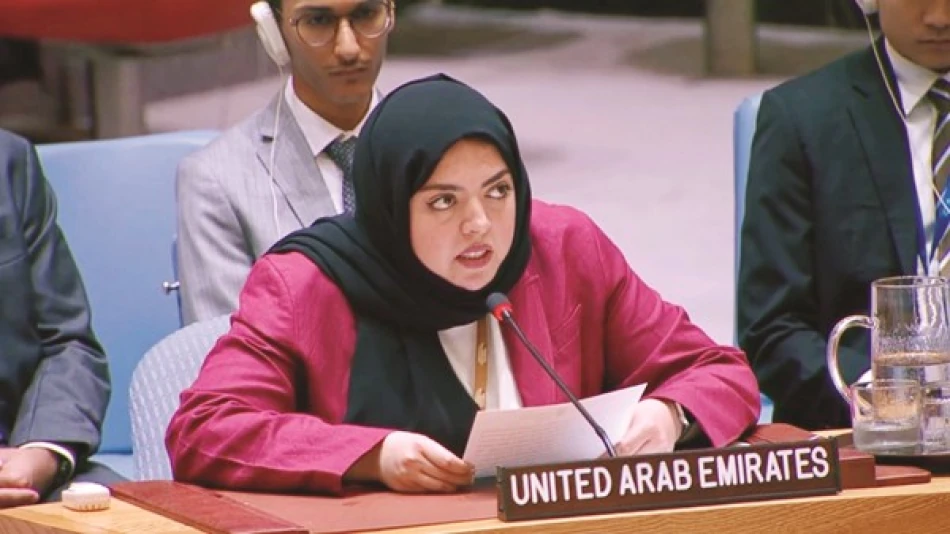
UAE Spearheads Maritime Corridors as Cornerstones of Global Peace and Security
UAE Calls for AI-Powered Maritime Security Revolution as Global Trade Routes Face Mounting Threats
The United Arab Emirates has positioned itself at the forefront of a technological transformation in maritime security, advocating for artificial intelligence and satellite systems to protect the sea lanes that carry 80% of global trade. Speaking at a UN Security Council session, the UAE outlined how emerging technologies could address escalating threats from piracy to climate change, while announcing its role as co-host of the 2026 UN Water Conference alongside Senegal.
Maritime Security Goes High-Tech
The UAE's emphasis on AI-driven maritime monitoring reflects a broader shift toward digitizing ocean security. Fatima Yousef, the UAE's acting chargé d'affaires at the UN, highlighted how rapid developments in artificial intelligence and satellite systems offer "unprecedented opportunities for threat detection, predictive analytics, and real-time monitoring."
This technological approach addresses a stark reality: maritime routes face an increasingly complex web of challenges, from traditional piracy and organized crime to geopolitical tensions, armed attacks, and climate-related disruptions. The UAE's SatGate project, a collaboration between the Ministry of Energy and Infrastructure and the Mohammed bin Rashid Space Centre, exemplifies this new approach by combining AI with advanced satellite technology for enhanced sea monitoring, weather prediction, and ship tracking.
Learning from Global Maritime Security Models
The UAE's tech-forward strategy mirrors similar initiatives by other maritime powers. Singapore has deployed AI-powered port security systems, while the United States has integrated satellite surveillance with machine learning for naval operations. However, the UAE's approach stands out for its emphasis on international cooperation and technology sharing, particularly with developing nations that lack advanced maritime monitoring capabilities.
Climate Change as a Maritime Security Multiplier
The UAE's presentation underscored how climate change amplifies maritime security risks, creating a feedback loop of instability. Rising sea levels and intensifying storms threaten freshwater sources and coastal communities, which in turn can destabilize maritime security. This interconnection between climate and water scarcity represents what the UAE called "closely interlinked challenges" that could "exacerbate instability and undermine maritime security in the long term."
The announcement that the UAE will co-host the 2026 UN Water Conference with Senegal signals the country's intention to link water security directly to maritime stability—a connection that many maritime security frameworks have historically overlooked.
Strategic Implications for Regional Powers
The UAE's maritime security initiative carries significant geopolitical weight, particularly given the country's position along critical shipping lanes including the Strait of Hormuz. By championing technological solutions and international partnerships, the UAE is positioning itself as a stabilizing force in a region where maritime tensions have repeatedly disrupted global supply chains.
This approach contrasts with more militaristic responses to maritime security threats. Instead of relying primarily on naval patrols and defensive measures, the UAE advocates for predictive systems that could identify and mitigate threats before they materialize.
Investment and Market Opportunities
The UAE's maritime security vision creates substantial opportunities for technology companies specializing in AI, satellite systems, and predictive analytics. The emphasis on international cooperation suggests potential for technology transfer agreements and joint ventures, particularly as the UAE seeks to build "strong partnerships" and establish regional centers for maritime security.
For investors, this represents a shift toward viewing maritime security as a technology sector rather than purely a defense concern. Companies developing AI-powered monitoring systems, satellite-based tracking solutions, and climate prediction models may find growing demand as more nations adopt similar approaches.
Building Coalition-Based Maritime Defense
The UAE's call for collaborative efforts through joint training programs, technical assistance, and regional centers reflects a recognition that modern maritime threats transcend national boundaries. This multilateral approach acknowledges that even technologically advanced nations cannot secure sea lanes independently.
The strategy suggests a fundamental shift from bilateral maritime security agreements toward broader coalition-building efforts. By emphasizing that "we can no longer work in isolation," the UAE is advocating for a more integrated approach to protecting the maritime domain that sustains global commerce.
Most Viewed News

 Layla Al Mansoori
Layla Al Mansoori






